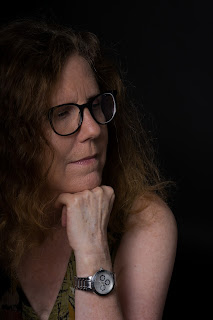Jeannée Sacken is the author of the new novel Double Exposure, a sequel to her novel Behind the Lens. A photojournalist and former English professor, she lives in Shorewood, Wisconsin.
Q: Double Exposure is your second novel featuring your character Annie—did you know when you started the first novel that you’d be writing a second one?
A: When I first began writing Behind the Lens, I fully intended it to be a stand-alone. But the farther I got into the novel, the clearer it became to me that the story I wanted and needed to write would take more than a single book. Besides which, Annie Hawkins and Finn Cerelli wouldn’t stop talking. So, Double Exposure came into being.
Q: How do you think Annie has changed from one book to the next?
A: Annie Hawkins has many dimensions to her character that keep me endlessly intrigued. Some things haven’t changed. She’s a seasoned war photojournalist who’s committed to her career.
A mother, she’s ridden with mom-guilt at missing much of her teenage daughter Mel’s day-to-day life as well as many important events. Returning home, she stumbles when making the transition from being in the field to being with her daughter. She’s also a loyal friend and absolutely committed to the education of girls.
Some things about Annie do evolve. In Behind the Lens, she’s haunted by horrific experiences from a previous assignment in Afghanistan. In Double Exposure, more ghosts surface, and her PTSD becomes bad enough that it threatens her career as well as her relationship with her lover, U.S. Navy SEAL Captain Finn Cerelli.
Also in the second novel, Annie grapples with the realization that she must become a better mother to her daughter. Perhaps the most pronounced change from book to book is that Annie progressively lets down the defenses she erected following her divorce and opens herself to a loving and passionate, although sometimes contentious, relationship with Cerelli.
Q: Why have you chosen to focus on Afghanistan, and how do you research your novels?
A: To write a novel about a war photographer, I needed a war and I wanted a U.S. military presence. Those two requirements led me to Afghanistan. Over the years, I’d read fiction and nonfiction set in that country. As a result, I was familiar with the wonderfully rich cultural traditions and the warm hospitality of the Afghan people.
Still, I had to research both novels extensively. Very briefly, the internet is an amazing resource and can be a writer’s best friend as long as she quadruple-checks everything.
I found maps, videos, images, history, among many other resources online. I regularly read blogs on Afghan culture and others written by war photojournalists. Then, there were the serendipitous discoveries of Dari proverbs and Pashtun landays (an oral tradition of women’s poetry).
Vetting was critical. I was fortunate to have the support of members of Masjid Al-Huda in South Milwaukee, who schooled me in Islam and Afghan culture. My brother, a retired U.S. Navy officer, was very helpful with all things military. Perhaps most instrumental was Heba Elkobaitry, an extraordinary sensitivity reader who corrected and refined my portrayal of Islam and Afghan culture.
Q: The writer Laurie Buchanan said of the novel, “Chock-full of raw emotion and visceral pain, it made me weep then rage at the plight of females in Afghanistan.” What do you think of that assessment, and what do you see for the future of women and girls in Afghanistan?
A: I’m incredibly honored that Laurie Buchanan had such a powerful response to both Behind the Lens and Double Exposure. To know that my novels touched her in these ways tells me that I did my job.
I, too, rage at the plight of women and girls in Afghanistan and am very fearful for their future. Recent rulings by the Taliban restricting girls’ education to no more than the sixth grade means that their lives will become more and more insular. There won’t be any women training to be doctors or dentists, teachers or lawyers, or politicians.
As a result, girls’ and women’s access to education, health care, legal rights, and political activism will be ever more truncated.
Q: What are you working on now? Will there be a third book in the series?
A: I’m currently working on book three in the Annie Hawkins Series which follows Annie back to Afghanistan in August 2021 when the Taliban retake control of the country.
Q: Anything else we should know?
A: A word about the audiobook versions of Behind the Lens and Double Exposure: I was fortunate to work with Craig Hart of Northern Lake Audio and Pink Flamingo Productions. He led me to the incomparable voice actress Nicole Swanson, who brought these two novels to life. She absolutely nails Annie Hawkins and all the other characters.
What impressed me about her narration is that she worked with a U.S. military translator to perfect the occasional phrases of Dari and Pashto that are sprinkled throughout both novels.
The audiobooks are available through Audible. The novels can be purchased at indie bookstores, Amazon and B&N, and online from the publisher, Ten 16 Press. A portion of all proceeds goes to support the education of women and girls.
--Interview with Deborah Kalb

.jpg)
No comments:
Post a Comment